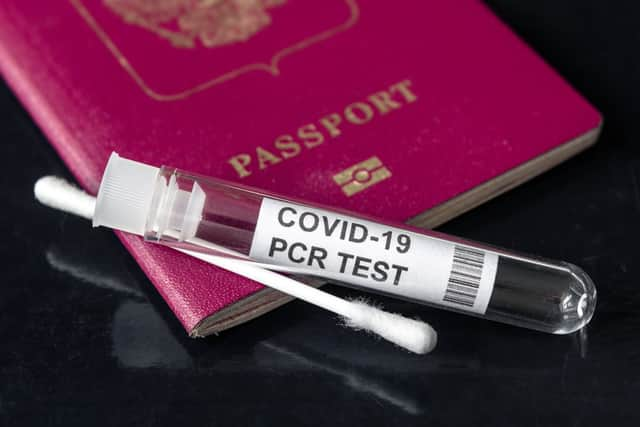Travel bosses demand end to expensive Covid tests as Omicron ‘has already spread’


The travel PCR test has been branded by industry leaders as "rapidly out of date" and "pointless" by industry leaders.
The introduction of these tests was a "devastating blow" to the travel industry, as aviation officials said rapid changes for UK entry makes it "impossible" for airlines to plan ahead.
What are the current testing regulations?
Advertisement
Hide AdAdvertisement
Hide AdThe regulations currently imposed, taking a PCR test two days before travelling to the UK and another one on or before day two after arrival, were an attempt to restrict the Omicron strain, which is now the dominant variant in Britain.
Prices for day two testing vary, with some costing upwards of £50.
The first official UK study reveals the risk of hospitalisation with Omicron is 50 to 70% lower than Delta, with several studies also suggesting Omicron is milder than other strains.
However, travel plans will continue to adhere to restrictions until the end of January, with testing and isolation expected to remain.
Advertisement
Hide AdAdvertisement
Hide AdThis news has led travel experts to question why transport tests designed to restrict travel are still in place, as it is damaging the industry.
What has been said?
Chief executive of travel consultancy,The PC Agency, Paul Charles, told MailOnline "The evidence is not there now for such restrictions to be in place coming into the UK.
"The rules are lacking evidence, there is no justification for a pre-departure test to the UK anymore. No-one needs to monitor Omicron coming in – it's already here.
"The PM needs to remove the pre-departure test as a minimum and turn the day 2 into an easier lateral flow test.
Advertisement
Hide AdAdvertisement
Hide Ad"Omicron is less dangerous than Delta – so why are the rules more severe than they were in Delta times?
"The rules in place have rapidly become out of date and they need to be removed urgently – there is no justification for them."
Director of the Tourism Alliance, Kurt Janson, said testing requirements were damaging the industry.
"They certainly make it difficult for it for the international travel sector whether it be inbound or outbound to function in a reasonable manner.
Advertisement
Hide AdAdvertisement
Hide Ad"It is something that needs to be resolved. From the inboard tourism perspective there is £30bn the UK earns – that's been down 80% over the past year.
"Resolving the restrictions on international travel needs to be done. The government has got a tourism recovery plan and the target is to get figures back to 2019 levels by 2023.
"Considering we have one of the highest rates of Omicron in the world, what is the point of getting people to get a day two test?
"There is a rational in other countries where Omicron is at low levels, but for people travelling to the UK there is a real question mark over what benefits it brings this country."
Will travel testing be looked at by the Government?
Advertisement
Hide AdAdvertisement
Hide AdAn ABTA spokesperson are questioned why the tests were still in place: "The Government has always been clear that once the Omicron variant is widespread across the UK there would be little rationale for retaining any restrictions on international travel.
"It's vitally important therefore that the additional testing requirements that were introduced are removed as quickly as possible, in line with scientific and medical advice, particularly as we are fast approaching the key booking season for next summer.
"With average annual revenue across the travel industry down by nearly 80% on pre-crisis levels – even before Omicron emerged – the Government must also urgently consider the case for furlough and other income support, especially if travel restrictions are going to be maintained for any significant period."
"We don't anticipate any measures being scrapped until at least the end of January. Even with the promise of a review every three weeks by the Department for Transport, there have been suggestions they'll be in place for two or three months," one senior aviation insider told The Times.
Depending on the data, travel testing will be looked at by the Government again, on 5 January.